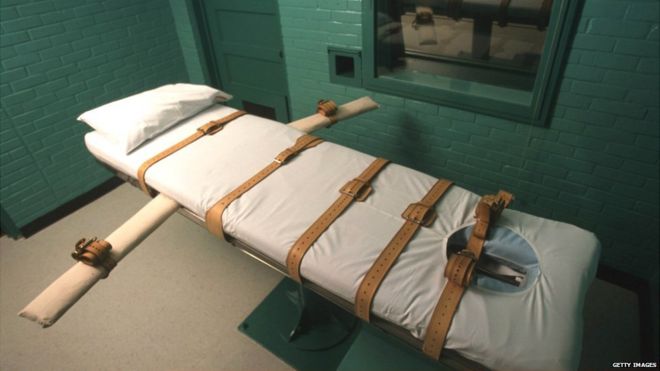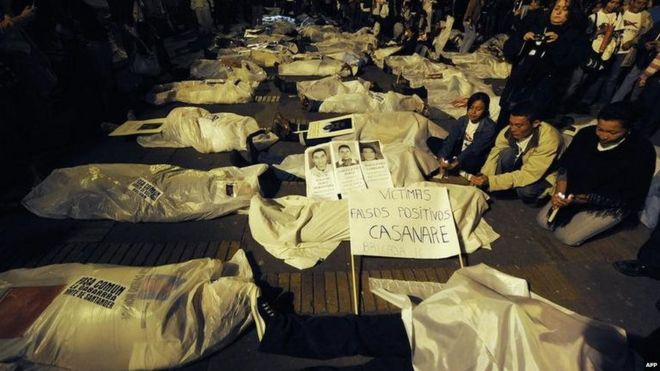Click here to read full stories From War Crimes Prosecution Watch Volume 10, Issue 8
By Samuel Miller
Impunity Watch Reporter, North America and Oceania
WASHINGTON, D.C., United States of America —
The U.S. Supreme Court on Monday upheld the use of a controversial drug for lethal injection in executions; however, the Supreme Court may have opened a larger question about capital punishment, when two justices in the minority newly questioned whether the death penalty violates the Constitution. Justice Samuel A. Alito Jr. wrote for the majority that included Chief Justice John G. Roberts Jr. and Justices Antonin Scalia, Anthony M. Kennedy and Clarence Thomas.

The Supreme Court re-instated the death penalty in 1976 after having suspended it earlier in the 1970s. Capital punishment is now used in 31 states and by the federal government.
In the case, called Glossip v Gross, three inmates in Oklahoma argued that the sedative could not achieve the level of unconsciousness required for surgery, meaning severe pain and suffering was likely. But the court, in a 5-4 decision, handed a loss to the inmates after judges ruled they did not prove that midazolam was cruel and unusual when compared to known and available alternatives.
The majority opinion, written by Justice Samuel Alito, was a departure from a series of legal victories for liberals in recent days, including gay-marriage rights and the preservation of a major component of Obamacare. The court’s majority held that prisoners challenging an execution method as posing an unreasonable risk of severe pain must show that the government has overlooked a more humane method of carrying out capital punishment.
In the majority opinion, Alito writes, “The prisoners failed to identify a known and available alternative method of execution that entails a lesser risk of pain, a requirement of all Eighth Amendment method-of-execution claims.” Alito went on to state, “Second, the District Court did not establish that Oklahoma’s use of a massive dose of midazolam in its execution protocol entails a substantial risk of severe pain.”
The four dissenting justices wrote scathing opinions denouncing the approval of the lethal injections, as well as the prisoner’s right to choose the method for their execution. In her dissent, Justice Sonia Sotomayor bitterly denounced the court’s holding that those challenging a particular execution protocol had to show that a more humane method was available.
“Under the Court’s new rule, it would not matter whether the State intended to use midazolam, or instead to have petitioners drawn and quartered, slowly tortured to death, or actually burned at the stake: because petitioners failed to prove there was an available alternative, their challenge would automatically fail.”
Justice Stephen Breyer, in his dissent, raised the issue as to whether the death penalty should be interpreted as constitutional. With the concurrence of Justice Ginsberg, Breyer wrote, “We believe it highly likely that the death penalty now violates the Eighth Amendment.”
Several US states turned to midazolam when European manufacturers stopped supplying sodium thiopental to US prisons because of an EU ban on the sale of products used in lethal injections.
The shortage of various drugs used by the 32 US states that still have capital punishment led to some reintroducing other controversial methods, such as the gas chamber and firing squad.
For more information, please see:
BBC News — US Supreme Court backs use of contentious execution drug – 29 June 2015
CNN — Supreme Court backs use of lethal injection drug – 29 June 2015
Politico — Supreme Court permits lethal injection technique – 29 June 2015
Reuters — Supreme Court upholds lethal injections, blocks pollution rule – 29 June 2015
USA Today — Supreme Court refuses to ban controversial method of execution – 29 June 2015
Washington Post — Supreme Court upholds lethal injection procedure – 29 June 2015
By Kaitlyn Degnan
Impunity Watch Reporter, South America
BOGOTA, Colombia — Human Rights Watch has released a 95-page report on evidence of false positive killings by Colombian troops between 2002 and 2008. At the time, Colombia was conducting frequent military operations against the Revolutionary Armed Forces of Colombia.

Over 180 battalions and tactical units are thought to have been involved in the killings over the course of six years. The killings were considered a measure of military success and were some times rewarded with cash and vacation time.
The killings sputtered out after the death of 19 young men from Bogota caught international attention and resulted in the Colombian army’s top commander stepping down. Since then about 800 army personnel have been charged with extrajudicial killings, most of them lower-ranking soldiers.
Colombia enacted the Legal Framework for Peace in 2012, a constitutional amendment that may allow impunity for atrocities committed by guerilla groups, paramilitary groups and the military upon the completion of a peace agreement between Colombia and FARC.
Very few of the army’s top officials, who the report alleges knew or should have known about the killings, have been charged with the crimes. Current commander of the Colombian Army General Jaime Laspirilla and commander of the armed forces General Juan Pablo Rodriguez have been summoned by the Attorney General’s office to give evidence. Colombian President Juan Manuel Santos defended the two men, saying that he was not aware of any investigation against them.
Those involved who have spoken out or testified about the issue have faced backlash from within the military. Sergeant Carlos Mora reported some suspicious deaths to his superiors in 2006 and soon faced harassment and frequently dangerous assignments. His superiors also implied that his family would be killed if he continued told anyone else. He would later bring his suspicions to high command.
In October 2014, Niixón de Jesús Cárcamo was murdered in the 11th Brigade’s military detention center. Cárcamo had confessed to being involved with the false positive killings and was providing information on his superiors’ actions to investigators.
The International Criminal Court’s Office of the Prosecutor has been closely watching the proceedings in Colombia. The Office will consider opening an investigation if it determines that the Colombian authorities are not genuinely engaging in the prosecutions.
The United States has provided Colombia with billions of dollars in military aid because the country was “threatened by an insurgency,” said Senator Patrick J. Leahy (D-Vt.). Leahy has criticized the aid given to Colombia in the past. Additionally, Human Rights Watch has called for the U.S. to suspend any military aid to Colombia that is subject to human rights conditions.
Colombia and FARC representatives have been in ongoing talks for a peace agreement since November 2012.
For more information, please see:
BBC – Colombia’s top army officials ‘knew of extrajudicial killings’ – 24 June 2015
Human Rights Watch – Colombia: Top Brass Linked to Extrajudicial Executions – 24 June 2015
By Delisa Morris
Impunity Watch Technical Director
CHARLESTON, South Carolina — President Barack Obama delivered a heart felt eulogy and rousing political speech and a thoughtful reconciliation on race in America when he left the White House for Charleston, South Carolina on Friday to eulogize the Rev. Clementa Pinckney, who was gunned down last week by a racist terrorist during Bible study.
The President surprised the nation when he belted out the chorus of ‘Amazing Grace’ at the end of his speech, bringing the mourners to their feet to join him in song.
“As a nation, out of this terrible tragedy, God has visited grace upon us for he has allowed us to see where we’ve been blind,” Obama said. “He’s given us the chance, where we’ve been lost, to find our best selves.”
From President to Preacher, the President’s remarks often sounded like a sermon with an organ in the background swooning behind the impassioned passages.
The President, first lady Michelle Obama, Vice President Joe Biden, a bipartisan host of high-level members of Congress and Hillary Clinton all attended the memorial service at TD Arena in downtown Charleston. Last Wednesday, a 21-year-old man opened fire at a Bible study inside Charleston’s Emanuel African Methodist Episcopal Church, killing nine.
The shooter declared he was there to “kill black people,” and an online manifesto attributed to him contained white supremacist screeds.
Obama, in his eulogy, said the killer likely assumed he “would deepen divisions that trace back to our nation’s original sin.”
“But God works in mysterious ways,” Obama said. “God had different ideas. He didn’t know he was being used by God.”
“The alleged killer could have never anticipated the way the families of the fallen would respond when they saw him in court in the midst of unspeakable grief, with words of forgiveness,” Obama said.
The country, he argued, has responded to the church shooting “with a thoughtful introspection and self-examination that we so rarely see in public life.”
See President Obama’s full remarks here.
For more information, please see:
CNN – Obama’s Charleston eulogy: ‘Amazing Grace’ – 27 June 2015
DailyMail – Obama’s amazing grace: President gives searing speech on race and leads church in song during emotional eulogy for pastor killed by race-hate gunman – 27 June 2015
The Washington Post – Obama calls for racial understanding, unity as thousands mourn S.C. pastor – 26 June 2015
Whitehouse.gov – Remarks by the President in Eulogy for the Honorable Reverend Clementa Pinckney – 26 June 2015